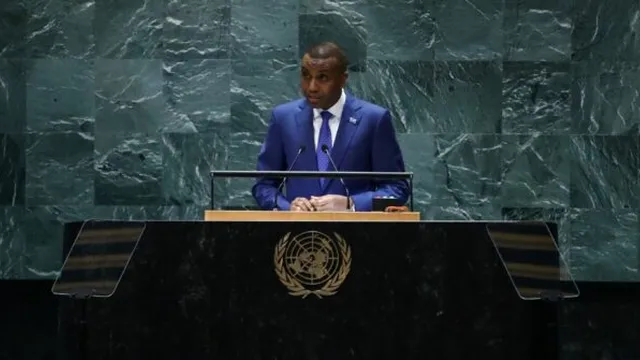
Somali PM accuses Ethiopia of violating territorial integrity
2024-09-28 06:52- Ethiopia announced plans to lease a coastal area from Somaliland, raising concerns in Somalia.
- Somalia's Prime Minister condemned these actions as a violation of territorial integrity and threatened to expel Ethiopian troops.
- The escalating tensions highlight the fragile relationship between Somalia and Ethiopia amid ongoing security challenges.
Express your sentiment!
Insights
On Friday, Somalia's Prime Minister Hamza Abdi Barre expressed strong condemnation of Ethiopia's recent actions, which he claims threaten Somalia's territorial integrity. This statement came in response to Ethiopia's announcement of plans to lease a coastal area from Somaliland, a region that declared independence in 1991 but is not internationally recognized. The situation escalated when Ethiopia indicated intentions to construct a naval base and commercial port in the disputed area, raising alarms in Mogadishu. Ethiopia, a landlocked nation, has long sought access to the sea, and Barre characterized the move as an unlawful attempt to annex Somali territory. In his address at the UN General Assembly, he emphasized the seriousness of the threat posed by Ethiopia's actions. Ethiopia's Foreign Minister Taye Atske Selassie dismissed Barre's accusations, suggesting that similar agreements have been made by other countries and accusing Somalia of inciting hostility to distract from internal political issues. In retaliation, Somalia has threatened to expel Ethiopian troops who have been part of an African Union mission against Al-Shabaab militants since 2007. Additionally, Somalia has entered into a military agreement with Egypt, which has raised concerns in Ethiopia regarding the potential for arms to reach Al-Shabaab. The African Union mission is set for a transition at the end of the year, with Egypt offering to replace Ethiopian forces. The ongoing tensions highlight the fragile relationship between Somalia and Ethiopia, particularly regarding territorial disputes and security concerns in the region. The situation remains precarious as both nations navigate their political and military strategies amidst rising tensions.
Contexts
The Horn of Africa has long been a region marked by territorial disputes, particularly between Somalia and Ethiopia. The roots of this conflict can be traced back to the era of colonialism, where the borders were drawn with little regard for the ethnic and cultural realities on the ground. The Ogaden region, rich in resources and strategically significant, became a flashpoint during the Ogaden War of 1977-78, when Somalia sought to annex the territory. Initial successes by Somali forces were met with a fierce counteroffensive from Ethiopia, bolstered by support from the Soviet Union and Cuba. The war ended with a withdrawal of Somali troops, but the underlying tensions remained unresolved, leading to a prolonged period of proxy conflicts and diplomatic standoffs. In recent years, the situation has been further complicated by a memorandum of understanding signed between Somaliland and Ethiopia, allowing Ethiopia to develop a naval base on Somaliland's coast. This agreement has reignited fears in Somalia, which views Somaliland as part of its territory. President Hassan Sheikh Mohamud has called for national unity and defense against what he perceives as an encroachment on Somali sovereignty. Rallies in Mogadishu reflect the public's outrage, as citizens express their determination to protect their homeland. Ethiopia, now the world's largest landlocked country, is seeking access to the sea, while Somaliland aims for international recognition. The stakes are high, as both parties navigate a complex web of historical grievances and contemporary geopolitical interests. Somaliland's foreign minister has suggested that the port deal could legitimize their quest for self-determination, potentially altering the balance of power in the region. As tensions simmer, the international community watches closely, aware that any misstep could lead to renewed conflict in a region already fraught with instability. The Horn of Africa remains a volatile landscape, where the echoes of history continue to shape the present and future of its nations.